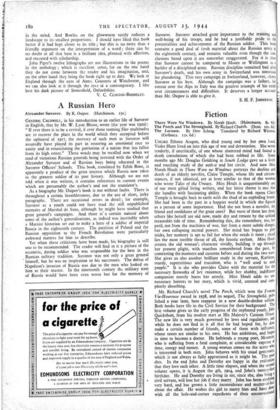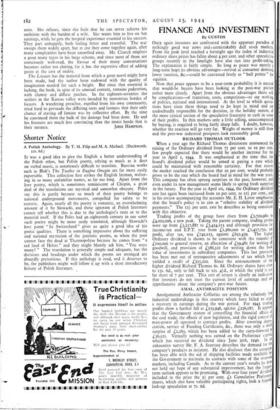Fiction
UNLIKE Ethnea Aragon, who died young and by her pwn hand, Violet Hunt lived on into this age of war and devastation. She ,wrote tenderly, if uncritically, of one whose shattered mind. had found in death consolations of which she had been robbed in life. Some months ago Mr. Douglas Goldring in South Lodge gave us a lively and touching study of the authar and her circle. And now Miss Norah.Hoult in There Were no Windows portrays the decline and death of an elderly novelist, Claire Temple, whose life and circum- stances, if not identical, are at least similar to that of the woman who wrote Tales of the Uneasy. Miss Hoult is unquestionably one of our most gifted living writers, and her latest theme is one that she handles with fascinating ability. When the book opens Claire Temple is brought back to earth with the thud of an exploding bomb. She had been in the past in a happier world in which she figured as a person of some importance. Had she not been a novelist, the friend and confidante of the great ones? But most of them'Ire dead, others like herself are old now, made dry and remote by the unkind inexorable tide of time. Remembering this, she remembers, too, her peril, not from the machines of war, but from a more subtle danger, her own collapsing mental powers. Her mind has begun to play tricks her memory is apt to fail her when she needs it most ; ahead
lies the most terrible threat of all, the lunatic asylum. Miss Houk creates the old woman's character vividly, building it up through
her present plight, with snatches remembered from the past, be contrasting the manners and customs Wore and during the two wars. She gives us also another brilliant study in the servant, Kathleen,
sturdy, superstitious and truculent, who is "well used to mad people." It is she who provides Claire with the material for the necessary fireworks of her existence, while her shabby, indifferent
companion merely bores her utterly. Miss Hoult adds no un- necessary horrors to her story, which is vivid, unusual and com- pletely absorbing.
Mr. Richard Church's novel The Porch, which won the Femina Vie-Heureuse award in 1938, and its sequel, The Stronghold, pub- lished a year later, here reappear in. a new double-decker edition. Both books have life in the Civil Service for their background. The first volume gives us the early progress of the orphaned youth, Joh° Quickshott, from his modest start at His Majesty's Custom House The new life is very much governed by laws and regulations, and while he does not find in it all that he had hoped for' he does make a certain number of friends, some of them with influence whose tastes are similar to his own. He has ambitions, and hope in time to become a doctor. He befriends a young poet, Mouncer, who is suffering from a fatal complaint, at considerable expense of time, energy and money. A young woman comes on the scene who is interested in both men. John behaves with his usual generosity, which is not always as filly appreciated as it might be. The Ilet dies. In the end John and Dorothy are happy in the realisnon that they love each other. A little time elapses, and when the second volume opens, it is August the 4th, 1914, and John's twenty firn birthday. He and Dorothy are living in sin; since she, also being i civil servant, will lose her job if they marry. John has been studying very hard, and has grown a little inconsiderate and matter-of-fact about the affair. He wishes the girl to marry him and have GI° with all the hole-and-corner expedients of their unconventional
state. She refuses, since she feels that he can never achieve his ambition with the burden of a wife. She wants him to live on her earnings, while he gets the hospital experience essential to his success. They part unhappily, both feeling bitter and resentful. The war sweeps them widely apart, but at last they come together again, after many complexities have been smoothed away. Mr. Church employs a great many types in his large scheme, and since most of them are consciously well-read, the flavour of their many conversations becomes rather too cloying, for it has the expensive effect of adding gusto at the cost of reality.
The Locusts has the material from which a great novel might have been made, had the author been endowed with the quality of imagination needed for such a height. But since that essential is lacking, the book, in spite of its unusual content, remains pedestrian, with clumsy and diffuse patches. In the eighteen-seventies the settlers in the Kansas valley were invaded by monstrous hordes of locusts. A wandering preacher, expelled from his own community, tried hard to persuade the differing sects and farmers that their only chance of staving off famine was by collective effort. By the time he convinced them the bulk of the damage had been done. He and his listeners are much less convincing than the insect horde that is



























 Previous page
Previous page